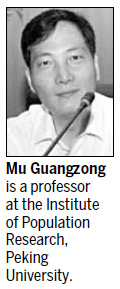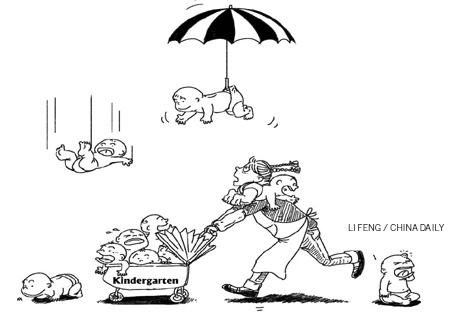Op-Ed Contributors
Preschools need more help
By He Bolin (China Daily)
Updated: 2011-03-31 07:53
 |
Large Medium Small |

The demand for preschool education is rising along with the increasing population of children. To meet the demand, education authorities have to plan and distribute resources in advance on the basis of population surveys, says Mu Guangzong, a professor at the Institute of Population Research, Peking University.
But the country, especially big cities such as Beijing, does not have enough kindergartens to accommodate all preschool-age children. Concurrently, parents are finding it increasingly difficult to get their children admitted to a kindergarten and struggling to cope with rising entrance fees.
Take Beijing for example. The municipal government says the city's current preschool education resources can meet the demand only of parents who have a Beijing hukou (house registration). This means a great number of migrant workers' children cannot be admitted to kindergartens.
Beijing's fast economic development has been propelled, to a large extent, by people, including migrant workers, from outside the city, and it is still attracting many of their likes. But the city government does not seem to have taken this fact into serious consideration while planning for kindergartens, Mu says.
This is true of not only Beijing, but other cities as well. In fact, a scientific decision-making mechanism to take care of the rising population and education is not in place in any city, Mu says. Also, information sharing between family planning authorities and other government departments has a lot of room for improvement.
Population change is related to availability of resources, environmental changes, and economic and social development. It is for the government to strike the right balance between regional development and people's demand for resources. In other words, the government has to pay attention to industrial development, housing construction and environmental protection, as well as chalk out a comprehensive development plan.
This calls for the government to take several aspects into account, Mu says.
First, instead of planning for preschool education resources according to the population of only hukou holders in the city, the government should also include the migrating population and the possible gap between overall demand and supply of resources.
Second, the government should analyze all population and resource surveys properly, Mu says. According to official figures, there were 415,750 births in Beijing between 2007 and 2009. Most of these children were big enough by last year to be admitted to preschools. But in 2009, kindergartens in Beijing had room for only about 248,000 children, which means a gap of more than 167,000 seats.
One of the main reasons for this gap is the decrease in the number of kindergartens in Beijing from 4,793 in 1990 to 1,266 in 2009. Across the country, their number fell by 35 percent between 1992 and 2002 to about 111,800. Behind the decrease is the historical State-owned enterprises' reform which led to the closure of many kindergartens for workers' children.
There is a latent period of population change (or growth) after which problems start popping up. People who come from other places to Beijing carry with them their requirements and demands for more resources along with their labor and intellectual force. This poses a challenge for the sustained development of the city. Furthermore, if the newcomers settle and start their families in the city, they become parents to children after a few years.
This raises the demand for more seats in kindergartens. But kindergartens in the city are too few to meet even the existing demand. That's why it is important for the Beijing government, as well as other cities' governments, to consider the migrating population while planning for preschool education in the long term, especially in areas where such people are concentrated.
Third, after carrying out proper surveys and analyses, the government should ponder the concrete measures it needs to take, Mu says.
Planning in advance is the best way to deal with the problem. In many countries, especially advanced ones, public and private preschools both get fiscal support from national and/or local governments. This ensures that every child that enters a kindergarten is fully or partly supported by the government.
There is a growing global agreement that preschool education is the key to a country's sound education system. If need be, charity organizations should be encouraged to help strengthen the preschool education system so that every child gets a chance to go to a kindergarten.
China has a lot to improve on this front. Since 2003, individuals and private organizations have been running more than 70 percent of the kindergartens in the country without getting any fiscal support from either the central or the local governments. To improve the situation, it is imperative that the government grants more funds to public as well as private kindergartens, Mu says.
The other choice for the government is to build more kindergartens - so that children can go to the nearest one - and make macro adjustments to meet the demands of the growing population. And the government should make enough education resources available to ensure new communities develop healthily.

(China Daily 03/31/2011 page9)
| 分享按钮 |